Abstract
Transfer of genes by injection of plasmid DNA into skeletal muscle has a wide variety of applications ranging from treatment of neuromuscular disorders to genetic vaccination. We examined each component involved in the intramuscular injection of plasmid DNA in terms of the induction of inflammatory responses. The insertion of a needle and the injection of a relatively large volume of saline caused very little muscle damage except in rare cases. In contrast, barium chloride-induced regeneration of muscle, injection of lipopolysaccharide, plasmid backbone or plasmid expressing a neo-antigen (β-galactosidase) all generated widespread inflammation of injected muscle, with mononuclear infiltrate, comprised largely of macrophages and with both CD4+ and CD8+ T lymphocytes, present. Such inflammation may hamper clinical application of this technology and may encourage undesirable immune responses in gene therapy trials. Inflammation was not greatly reduced by CD4- or CD8-depleting antibodies, suggesting this initial inflammation did not involve T cells, but methylation of plasmid DNA before injection substantially lessened the inflammatory response and resulted in longer term expression of the transgene.
Similar content being viewed by others
Author information
Authors and Affiliations
Rights and permissions
About this article
Cite this article
McMahon, J., Wells, K., Bamfo, J. et al. Inflammatory responses following direct injection of plasmid DNA into skeletal muscle. Gene Ther 5, 1283–1290 (1998). https://doi.org/10.1038/sj.gt.3300718
Received:
Accepted:
Published:
Issue Date:
DOI: https://doi.org/10.1038/sj.gt.3300718
- Springer Nature Limited
Keywords
This article is cited by
-
Minicircle DNA Provides Enhanced and Prolonged Transgene Expression Following Airway Gene Transfer
Scientific Reports (2016)
-
TLR9 and IRF3 Cooperate to Induce a Systemic Inflammatory Response in Mice Injected With Liposome:DNA
Molecular Therapy (2010)
-
Induction of Tumor-specific Immune Response by Gene Transfer of Hsp70-cell-penetrating Peptide Fusion Protein to Tumors in Mice
Molecular Therapy (2010)
-
Plasmid injection and application of electric pulses alter endogenous mRNA and protein expression in B16.F10 mouse melanomas
Cancer Gene Therapy (2010)
-
DNA-vaccination via tattooing induces stronger humoral and cellular immune responses than intramuscular delivery supported by molecular adjuvants
Genetic Vaccines and Therapy (2008)




